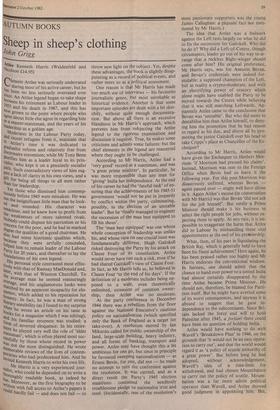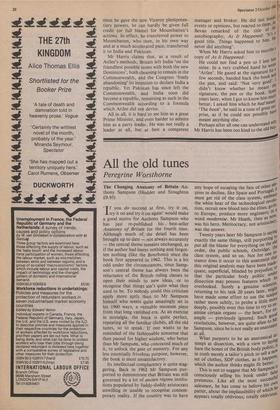AUTUMN BOOKS
Sheep in sheep's clothing
John Grigg
Clement Attlee was seriously underrated during most of his active career, but he has been no less seriously overrated ever since. An Attlee legend began to take shape between his retirement as Labour leader in 1955 and his death in 1967, and this has ritlw grown to the point where people who agree about little else agree in regarding him as a master-statesman, and the years of his leadership as a golden age. Moderates in the Labour Party today, and recent refugees from it, maintain that 111 Attlee's time it was dedicated to gradualist reform and relatively free from doctrinaire extremism; while Mr Tony Benn glorifies him as a leader loyal to its prin- elPles, who kept it on a genuinely socialist Path. Such contradictory views of him sug- ges t a lack of clarity in his own views, and a Ft for being all things to all men rather than for leadership. Yet those who dismissed him contemp- tuously before 1945 were mistaken. He was riot the insignificant little man that he look- ed and sounded. His character was tenacious and he knew how to profit from weaknesses of more talented rivals. °b°dY could dispute his patriotism or his concern for the poor, and he had in marked degr- ve the qualities of a good chairman. He so had some histrionic qualities which, because they were artfully concealed, helped him to.remain leader of the Labour p artY for 20 years, and thereafter to lay the foundations of his own legend.
His personal style contrasted most effec-
t. ilvelY with that of Ramsay MacDonald and, ttter, with that of Winston Churchill. To ,ne average man he seemed reassuringly gverane , and his unglamorous looks were '"atehed by an apparent incapacity for elo- which added to his reputation for 1°nestY. In fact, he was a man of strong wt,..erarY sensibility (as I found to my surprise b nen he wrote an article on his taste in °Os for a magazine which I was editing), aftld his familiar terseness was studied: a °nu of inverted eloquence. In his retire- _Ill he played very well the role of 'elder statesman', which is often played most suc- wcessr • ullY by those whose record in power as not the most distinguished. He wrote memorable reviews of the lives of contem- poraries who had predeceased him. And he Invited Kenneth Harris to write his own life. Mr Harris is a very experienced jour- thallst, who could be depended on to write a °roughly readable book, as indeed he h
,.a•!• Moreover, as the first biography to be written with full access to Attlee's papers it could hardly fail — and does not fail — to throw new light on the subject. Yet, despite these advantages, the book is slightly disap- pointing as a record of political events, and rather more so as a political assessment.
One reason is that Mr Harris has made too much use of interviews — his favourite journalistic genre, but most unreliable as historical evidence. Another is that some important episodes are dealt with a bit sket- chily, without quite enough documenta- tion. But above all there is an excessive blandness in Mr Harris's approach, which prevents him from subjecting the Attlee legend to the rigorous examination and discussion it requires. True, he makes some criticisms and admits some failures: but the chief elements in the legend are reasserted where they ought to be challenged.
According to Mr Harris, Attlee had a `very good' record as a statesman, and was 'a great prime minister'. In particular, he was more responsible than any man for `giving' India her independence. At the end of his career he had the 'fateful task' of en- suring that the achievements of his 1945-51 government 'would not be put in jeopardy by conflict within the party, culminating, possibly, in the election of an unstable leader'. But he 'finally managed to engineer the succession of the man best equipped to fill his shoes'.
The 'man best equipped' was one whose whole conception of leadership was unlike his, and whose view on one crucial issue was fundamentally different. Hugh Gaitskell risked destroying the Party by his attack on Clause Four of its constitution. Attlee would never have run such a risk, even Wile had shared Gaitskell's view of Clause Four. In fact, as Mr Harris tells us, he believed in Clause Four 'to the end of his days'. If the definition of a moderate includes being op- posed to a wide, even theoretically unlimited, extension of common owner- ship, then Attlee was no moderate.
At the party conference in December 1944 there was a rebellion from the floor against the National Executive's cautious policy on nationalisation (which specified only the Bank of England as a target for take-over). A resolution moved by Ian Mikardo called for public ownership of the land, large-scale building, heavy industry, and all forms of banking, transport and power. Attlee may have thought this a bit ambitious for one go, but since in principle he favoured sweeping nationalisation — as Ernest Bevin, for one, did not — he made no attempt to turn the conference against the resolution. It was carried, and as a direct result the Party's 1945 election manifesto contained the needlessly troublesome pledge to nationalise iron and steel. (Incidentally, one of the resolution's
most passionate supporters was the young James Callaghan: a piquant fact not men- tioned by Mr Harris.) The idea that Attlee was a bulwark against the Left rests largely on what he did to fix the succession for Gaitskell. Why did he do it? Why did a Left-of-Centre, though circumspect, leader go out of his way to ar- range that a reckless Right-winger should come after him? His original preference, Mr Harris says, was for Aneurin Bevan, and Bevan's credentials were indeed for- midable: a supposed champion of the Left, but in reality a crypto-moderate, and with an electrifying power of oratory which alone might have enabled the Party to be moved towards the Centre while believing that it was still marching Leftwards. Ap- parently Attlee came to the conclusion that Bevan was 'unstable'. But who did more to destabilise him than Attlee himself, oy deny- ing him the promotion that he had reason to regard as his due, and above all by pro- moting the junior Gaitskell over his head to take Cripps's place as Chancellor of the Ex- chequer?
According to Mr Harris, Attlee would have given the Exchequer to Herbert Mor- rison `if Morrison had pressed his claims'. Instead, Morrison was sent to the Foreign Office when Bevin had to leave it the following year. For this post Morrison was disastrously unfitted, whereas Bevan again passed over — might well have shone in it. Again Attlee's excuse (in conversation with Mr Harris) was that Bevan 'did not ask for the job himself'. But surely a Prime Minister should make it his business to select the right people for jobs, without ex- pecting them to apply. At any rate, it is im- possible to exaggerate the harm that Attlee did to Labour by mishandling these vital appointments at the end of his premiership.
What, then, of his part in liquidating the British Raj, which is generally held to have been his finest achievement? Here again, he has been praised rather too highly and Mr Harris endorses the conventional wisdom. In fairness, one should admit that the chance to hand over power to a united India had almost certainly disappeared by the time Attlee became Prime Minister. He should not, therefore, be blamed for Parti- tion itself. But he might have averted some of its worst consequences, and anyway it is absurd to suggest that he gave in- dependence to the subcontinent. Since Bri- tain lacked the force and will to hold Palestine after 1945, a fortiori there could have been no question of holding India.
Attlee would have nothing to do with Wavell's 'Breakdown Plan' in 1946, on the grounds that 'it would not be an easy opera- tion to carry out', and that the world would regard it as 'a policy of scuttle unworthy of a great power'. But before long he had adopted, without acknowledgement, Wavell's idea of a time-limit for withdrawal, and had chosen Mountbatten to carry out the policy of scuttle. Mount- batten was a far more adroit political operator than Wavell, and Attlee showed good judgment in appointing him. But, since he gave the new Viceroy plenipoten- tiary powers, he can hardly be given full credit (or full blame) for Mountbatten's actions. In effect, he transferred power to Mountbatten, who then, in his own way and at a much accelerated pace, transferred it to India and Pakistan.
Mr Harris claims that, as a result of Attlee's methods, Britain left India 'on the friendliest possible terms with both the new Dominions', both choosing to remain in the Commonwealth, and the Congress 'freely abandoning' its intention to declare India a republic. Yet Pakistan has since left the Commonwealth, and India soon did become a republic, remaining as such in the Commonwealth according to a formula which Attlee did not devise.
All in all, it is hard to see him as a great Prime Minister, and even harder to admire him as a party leader. He was not really a leader at all, but at best a competent
manager and broker. He did not mould I 1 events or opinions, but reacted to their' '
As Bevan remarked of the title of
P'S I hi
autobiography, As It Happened: 'Its" good title. Things happened to him. -- never did anything'. me When Mr Harris asked him to inscribe a copy of As It Happened: He could not find a pen so I lent him mine. In a very crabbed hand he wrote `Attlee'. He gazed at the signature ford a few seconds, handed back the book all, the pen, and said: 'Not very good'. ' didn't know whether he meant the signature, the pen or the book. Some years later, when I got to know him much better, I asked him which he had Malt. `The book', he said in a tone of great sor" prise, as if he could not possibly have meant anything else.
Perhaps after all one can understand why Mr Harris has been too kind to the old boY'







































 Previous page
Previous page